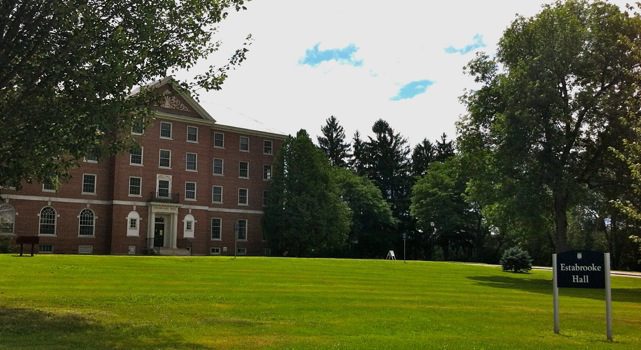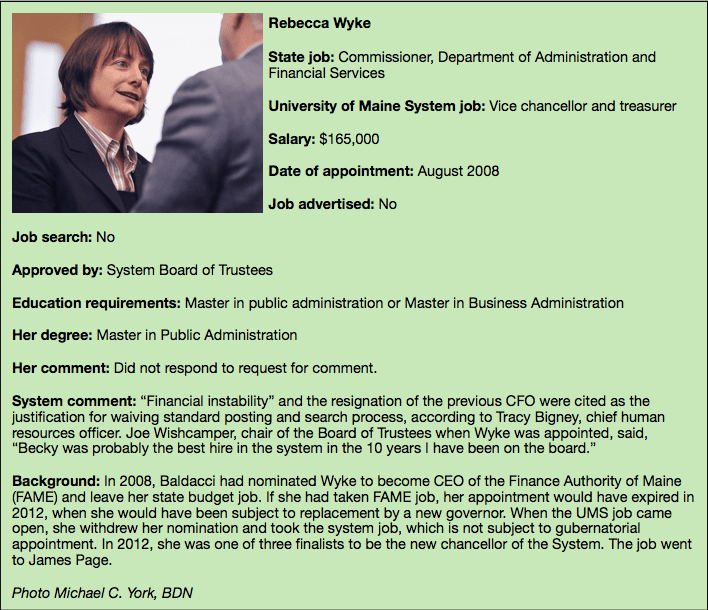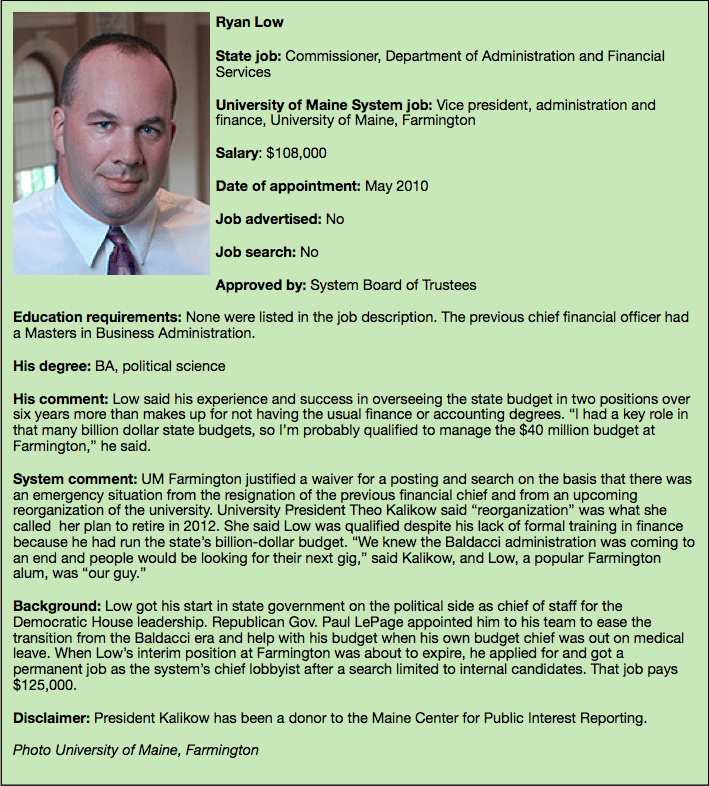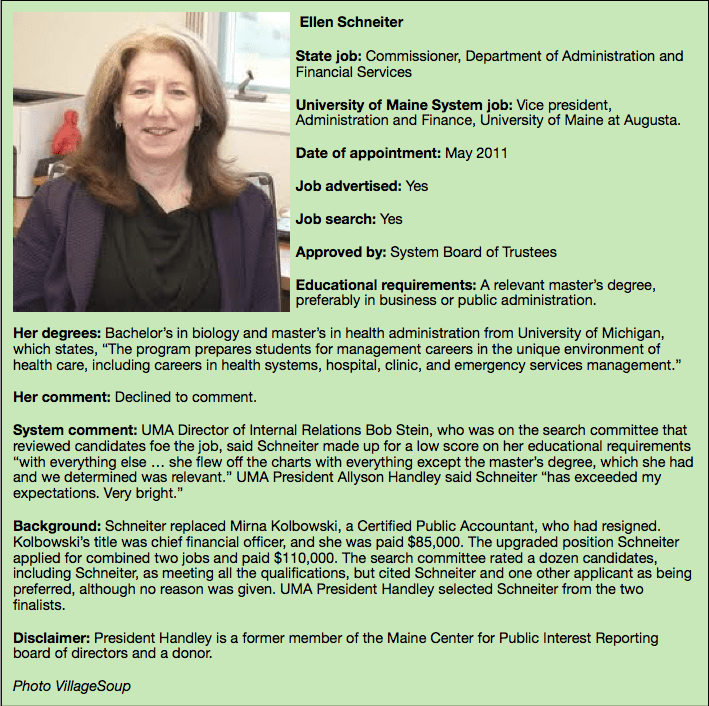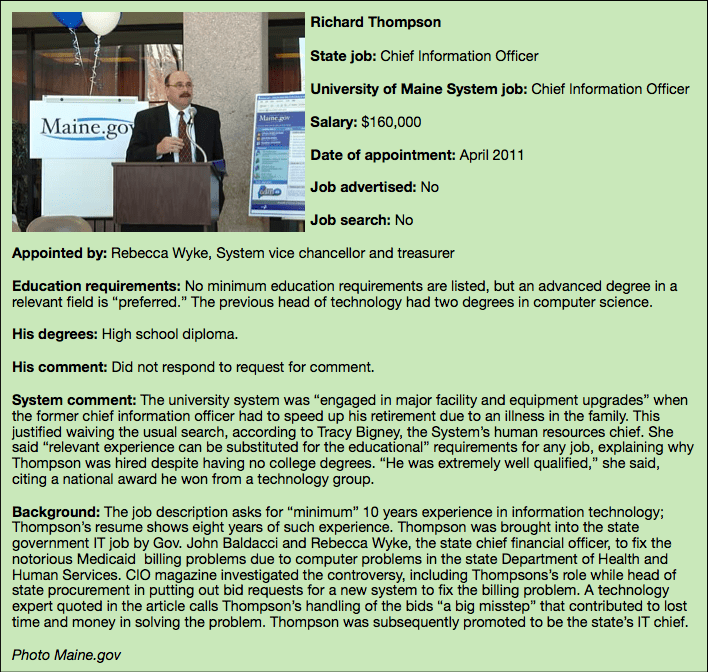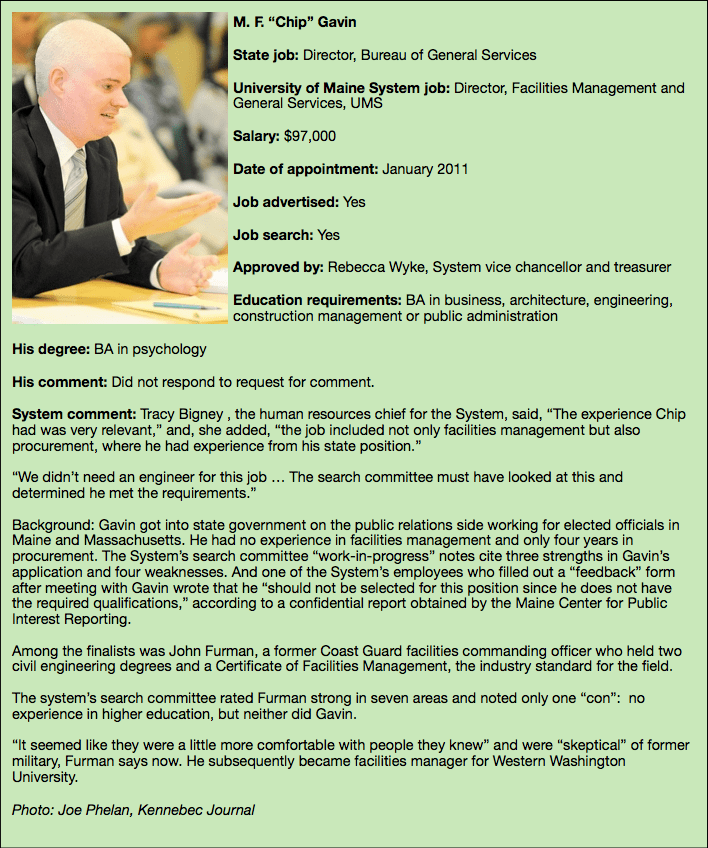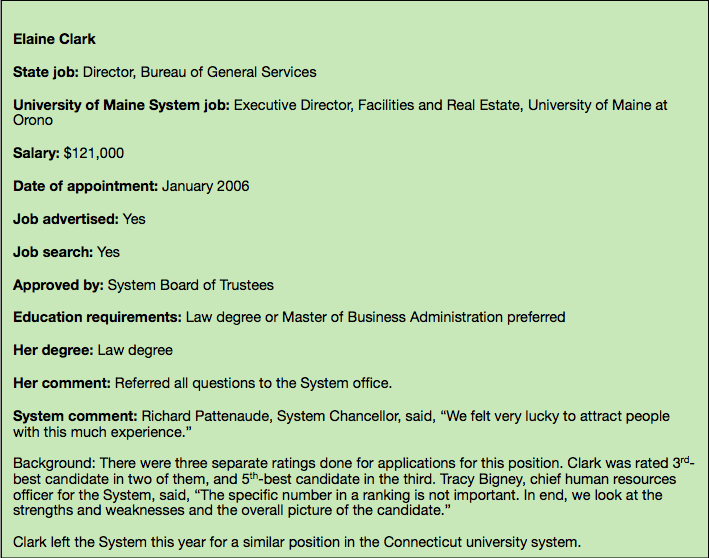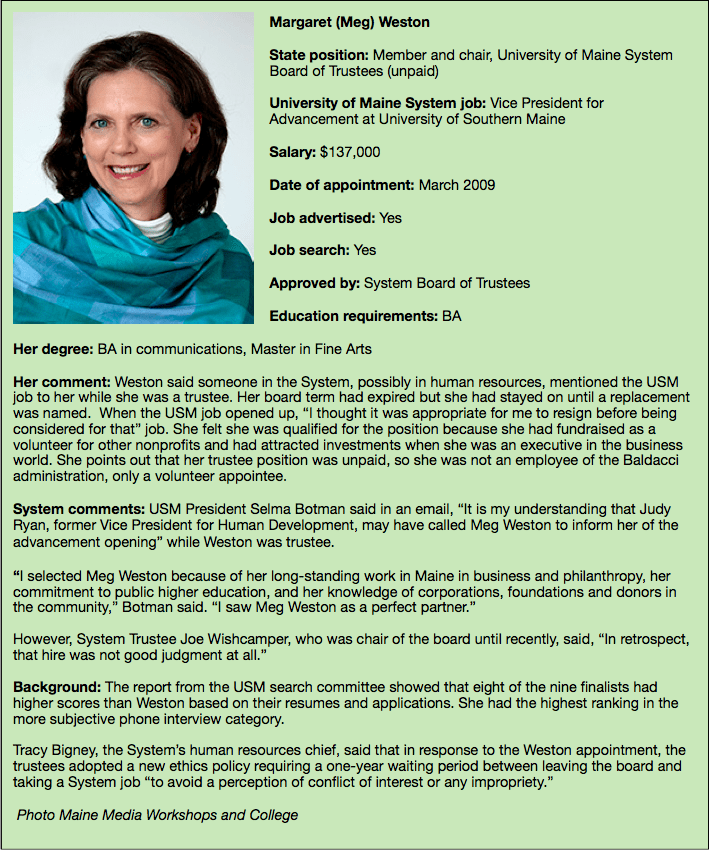Hiring records at the University of Maine System show loopholes, waivers and personal and political connections played a significant role in the appointment of seven state officials into some of the highest paying non-teaching jobs in the system.
Six of the seven worked for the same state agency during the administration of former Gov. John Baldacci and the seventh was a member of the System Board of Trustees during that period.
The current and immediately past chairs of the board both said that while they believe there was no improper influence in most of the hires, they also said a review of the process is warranted.
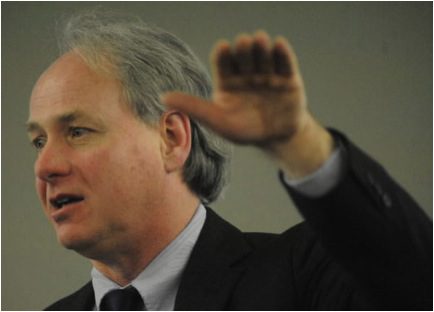
And the new chancellor of the System, James Page, said he will add the hiring issue to a review he is doing about recent questions involving System pay raises.
“I take the allegations and concerns very seriously, but I’m not prepared to say what the strengths of those allegations and concerns are,” Page said. “Everything will be looked at.”
For three jobs – two of which oversee multi-million-dollar budgets – the System hired the former state staffers directly into the higher education positions, meaning there was no customary search for the best-qualified people.
Each of those job openings, which pay more than $100,000, were given emergency status that allowed the System to waive a policy that requires openings be advertised and a search conducted.
In another case, a trustee resigned from the board and a month later applied for and was subsequently given a $137,000 job at the University Southern Maine. Officials say this appearance of “impropriety” prompted the board to approve a new conflict of interest ethics policy requiring a one-year waiting period.
In other cases, administration officials were given jobs even though they did not have the college degrees the system listed as requirements or were not ranked as the top candidate.
Excluding benefits, the annual payroll for the seven positions is $898,000.
The use of the university system as a haven for high-level state officials did not occur under the previous governor, Angus King. Only one top King staffer went on to a system job, according to officials, and so far no one from the LePage administration has moved into a top UMS job.
Most of the seven positions were approved by the trustees, who are appointed by the governor.
Richard Pattenaude was chancellor of the system while six of the seven appointments were made, some of them by him personally. He relinquished the position earlier this year.
Pattenaude said the connections of the seven system officials to the Baldacci administration was a coincidence and that he was never asked to find them a job.
“I understand why you would ask that question,” he said. But, he added: “No job was ever created for anyone … all are performing at the highest level.”
The hiring questions come on the heels of another personnel controversy in the system. The Portland Press Herald and Bangor Daily News revealed that the system gave millions of dollars in discretionary pay raises in recent years, while facing multi-million-dollar budget cuts.
Page, who took over on March 20, has said the pay raise reports “troubled” him and new discretionary raises were suspended or require his approval while he looks onto the issue.
Joe Wishcamper, who was chair of the System’s Board of Trustees when most of these appointments were made, acknowledged that “short cuts” may have been taken to hire people who were already known to the System from their state government work.
Although be believes none were the result of “inside baseball,” he added that the hiring processes “raise legitimate concerns and those concerns should be aired and reforms and changes made to take them into account.”
The hiring pattern was discovered in documents provided by the System in response to a Freedom of Access Act request by the Maine Center for Public Interest Reporting and the Bangor Daily News.
The seven are (with more information on each individual at the bottom of this story):
Rebecca Wyke: currently the System’s vice chancellor of administration and finance. She was hired without a job posting or job search. She had been Baldacci’s Commissioner of Administration and Financial Services (DAFS).
Ryan Low: hired as vice president for administration and finance at the University of Maine at Farmington without a posting or search. He held Wyke’s position after she went to the System job. He has since been promoted to be the System’s chief lobbyist after a job search limited to only other System employees.
Ellen Schneiter: named vice president for administration and finance at the University of Maine at Augusta. While there was a job search, her degree is not in the field required by the job description. She held the DAFS job after Low left.
Richard Thompson: chief information officer for the System, was hired without a posting or job search. He was hired despite having only a high school education and replaced a man with two degrees in computer science. He had been chief information officer in the Baldacci administration.
M. F. “Chip” Gavin: director of facilities management and general services for UMS, was hired despite not having a degree in any of the required fields, such as engineering, and despite a mostly critical report from the system’s own search committee. One of the finalists passed over in favor of Gavin had two engineering degrees and years of experience in facilities management. Gavin had been director of general services for Baldacci.
Elaine Clark: executive director for facilities and real estate at the Orono campus, was hired despite being rated No. 3 and No. 5 in search committee documents. She had been director of general services for the state. She has since left the job.
Margaret “Meg” Weston: vice president for advancement at the University of Southern Maine, was hired despite having no professional experience in fundraising. She applied for the job one month after resigning from the UMS Board of Trustees, prompting a new ethics policy requiring a year’s waiting period for moving from the board to a paid job in the system. She was appointed to the board by Gov. King and was reappointed by Gov. Baldacci. It was during the Baldacci appointment that she got the USM job, which she has since left.
Only two of the seven responded to the Center’s request for comment. Low and Weston said they believe they were qualified for their jobs.
Former Gov. John Baldacci, responding to question by email, wrote, “The men and women who serve at the top levels of Maine government are some of the most qualified in the state and have numerous opportunities for employment. I’m proud that members of my administration decided to continue public service when they could have found much more lucrative employment in the private sector.”
But a national expert of political patronage said the hires represent an “outrageous example” of using a higher education system to provide safe jobs for those with the right connections.
Martin Tolchin and his wife, Susan, are co-authors of “Pinstripe Patronage: Political Favoritism from the Clubhouse to the White House and Beyond.”
Tolchin said the University of Maine System “is being used as a dumping ground” for friends and supporters from the higher levels of state government.
Howard Segal, a professor of history at the University of Maine at Orono for the past 26 years, is a member of the Faculty Senate. He said the hires confirmed his belief that at the upper levels of the System “education is not the issue – political power is.”
“It’s terrible business-as-usual, and it’s outrageous,” he said. “These are my tax dollars, and I’m infuriated.”
POLICIES HAVE LEEWAY
The System’s hiring policy manual states, “It is impermissible to hire an individual who does not meet the state minimum qualifications.”
Former Chancellor Pattenaude and Human Resources Chief Human Resources Officer Tracy Bigney said the rules allow leeway, even with the minimum standards policy.
“When you get to a senior level,” said Pattenaude, “experience weighs as much or more than a degree from years ago.”
And Bigney said, “We are usually quite careful to say relevant experience can be substituted for education.”
However, none of the job qualification documents provided to the Center by the System’s office state that experience can be substituted for the educational requirements.
Wishcamper, who is president of a real estate development firm, said, “I believe none was a political appointment. I have had extensive experience working with governmental bodies and have seen many that are populated with patronage appointments to high level jobs. I have seen no evidence of this in the UMaine System.”
He likened some of the System hires to his personal experience in business, where an applicant who you already know is a “lower risk” than other applicants.
(All of the six former state employees worked in the same department, Administration and Financial Services, which was headed Wyke. She also headed that department during the time period the other five worked there.)
“To some extent, decisions were probably made here to take short cuts in the process rather than the full blown process the policy called for,” Wishcamper said. “My impression is there was probably someone available who we really wanted.”
Michelle Hood, the current chair of the UMS trustees, said she is confident the hires were made wisely, but did not recall details of any of the hires except Low’s.
“I personally have seen no evidence that there is an influence being applied from the governor’s office,” legislature or other policy makers in Augusta, she said.
But, she added, “I certainly plan to talk with the board and chancellor about some concerns some people might have about this to make sure we’re being as transparent as we can be.”
The seven appointments
Bangor Daily News reporter Nick McCrea contributed to this story.


